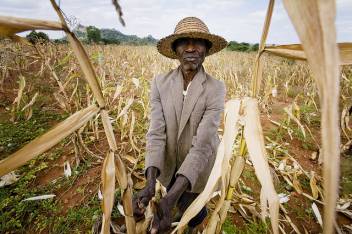 As the recent G8 Nutrition Summit shows, governments and NGOs have often overlooked the nutrition needs and food security of older people.
As the recent G8 Nutrition Summit shows, governments and NGOs have often overlooked the nutrition needs and food security of older people.
The event, held on 8 June, brought together global leaders from diverse fields, including science, politics and civil society. However, the focus was almost entirely on preventing malnutrition in women and children. Although these groups are of course important, we cannot ignore older people’s right to food security.
New initiative on ageing and food security
Thankfully, a joint initiative on ageing, food and nutritional security was also launched last week at the African Union Headquarters in Addis Ababa, Ethiopia. The working group was set up by the Africa Population and Health Research Centre (APHRC) and their Centre for Gender and Social Development, the UN Economic Commission for Africa’s Department of Social Affairs and the African Union Commission (AUC).
I was fortunate enough to attend the working group. Its specific remit will span a period of 18 months and will focus on the following core question: “What is the relevance of Africa’s older population to realising a demographic dividend and the achievement of food and nutritional security in the region – and how can the links be harnessed?”
By demographic dividend, we mean the window of opportunity in the development of a society or nation that opens up as fertility rates decline when faster rates of economic growth and human development are possible when combined with effective policies and markets.
Practical work to improve nutritional security of older people
There are examples of practical programmes to meet older people’s nutrition needs but more are needed. The Food and Agriculture Organization, for instance, has supported a number of projects to improve the nutritional security of vulnerable older people. A project in Lesotho focused on increasing homestead vegetable production through the promotion of keyhole gardens. A keyhole garden, so called because of its shape, is a round, raised plot supported with stones and covered with layers of locally-made compost.
A central basket, filled with grass and leaves, is used for irrigation. A small pathway leads to the central basket, allowing a person to reach all parts of the plot and work it without bending. Assessments in Lesotho showed that keyhole gardens significantly improved access to a variety of foods. They have been replicated in other parts of sub-Saharan Africa.
The working group is composed of researchers, global, regional and country bodies focusing on a variety of issues including agriculture, population, development, health, youth and ageing.
After initial discussions, we decided to refocus the core question so that it takes into account the issues raised during the initial meeting. For example, food and security should not be the only themes addressed. However, we also acknowledged that we should not make the subject too wide.
Links to post-2015 discussions
Ultimately, the outputs of the working group will include a final report, a series of fact sheets and policy briefs based on research questions, social media updates and thematic working papers to address the dearth of information on ageing in Africa and the demographic dividend.
We will also link these outputs with other discourses including the post-2015 discussions, the eight key priorities of the AUC strategic plan and the existing policy frameworks focusing on ageing both globally and in Africa.
A follow up meeting is planned in Nairobi, Kenya to discuss the revised core question and how to approach the six key objectives of the working group.
It is encouraging that we are finally having discussions around these important areas which include older people and that take into account the reality that as a global population, we are ageing.
Find out more about our work in health and social protection.
